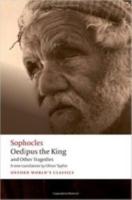
OUP (2105) h/b 384pp £20 (ISBN 9780199286232)
T. begins his Foreword to this selection of these four plays by Sophocles with a personal comment: ‘I have long harboured the ambition to compose a verse translation of Sophocles since I was a student, when my first love was Antigone … I have hugely enjoyed the challenge of finding a voice for this undertaking, a register that is not mundane, but also not overblown, and a metric which clearly differentiates speech and song. I only hope that it will prove as enjoyable to read as it was to write.’
To this non-specialist (who has long found Antigone to be the one tragedy to which he returns), his opening illustrates his personal approach, his search for voice and balance, his enthusiasm for the task and material and, not least, the humour, that can be found throughout this admirable text.
T. also emphasises that he has made a version for the page rather than the stage. Had it been otherwise, he would have moulded the translation differently; yet throughout the plays we are made aware of the potentialities of the staging inherent in the text. In the ‘Introduction: Sophocles and Greek Tragic Theatre’ that follows, he makes clear that the four plays were selected on an editorial rather than a chronological decision.
In the ‘Introduction to Oedipus the King,’ T. develops his interpretation of Oedipus’ journey, arguing that we construct stories of our lives for ourselves, and yet those stories may be mistaken. In the beginning, Oedipus cannot see the truth of his situation and fate, while at the end, he still gives commands, not fully realising that his power has gone. T. comments ‘We are trapped in the house of our life’. Here are a directness and simplicity that convey the depth and range of powerful emotions as Oedipus experiences a dawning understanding of his acts of pollution and of the conviction of his guilt.
Aias is another towering figure who finds himself caught in conflict with the gods. Driven mad, he destroys flocks and shepherds in a bloody massacre, convinced that he is pursuing Odysseus, in particular, and the Greek forces in general, to satisfy his burning resentment concerning the gift of Achilles’ armour by the Greek leaders to Odysseus rather than to himself. The first we hear from Aias are his cries of distress from offstage until, again in his right mind, he recognises his crimes against the gods and fellow soldiers.
Once again the language is of regret, self-justification and pain but gradually we come to recognise the shards of nobility that remain. In a long soliloquy, he works through his situation but each idea that presents itself is unconvincing as he seeks to find a way
To live well or to die well:
Those are the only options for a noble man.
He is gradually being driven to the only solution that will satisfy him, but at the same time the play offers us a move to a softer tone as he thinks about his responsibility to his father and as he engages with his wife, brother and son, the last of whom he leaves in a speech of tender emotion, before he throws himself on his sword. T. and Sophocles have taken us from the horrors of melodrama though tenderness, to serious thought and emotion and on to the tragedy of lost nobility: a significant achievement.
T. describes Philoctetes as yet another untypical Greek tragedy. The hero had been abandoned by Odysseus on this deserted island nearly ten years before. Now the latter comes to steal from Philoctetes the bow and arrows that have been prophesied will bring about the fall of Troy. The play revolves round the arguments about the nature of right as applied to the plan to steal the weapons, and explores possible solutions. In the last section of the introduction to the play, T. considers the significance of some of the possible endings.
Oedipus at Colonus is fittingly last in the sequence, concerned as it is with old-age, suffering and death. Once again, T. finds features not necessarily characteristic of Greek tragedy, an idea he has discussed in three of the plays. He notes the importance of place and of the blind old man, who, onstage almost throughout, dominates the action and other characters. He refers to the wide range of emotion displayed as matters move from Oedipus’ search for a place first to rest and then to face his end, through the relationship between Thebes and Athens, to the several conflicts within Oedipus’ family. Once again, he is interested in possible resolutions. However, the mystery of Oedipus’ end remains just that, ‘shrouded in quiet acceptance’:
But Theseus stood there still, his hand held up
Before his face to shield his eyes,
As if some awesome thing had come in sight,
Something unbearable to look upon….
T. makes a final point, though, that the endings include the fate of Antigone, thus casting ‘a dark shadow across what otherwise might seem a purely silver lining conclusion to Oedipus’ life.’
T. has produced a learned, thoughtful and detailed exploration of the plays. Through the translations, interpretations and arguments, he seeks to define the meanings of the plays (as he says, the how and why), summed up in the question: ‘What does its drama exemplify about the human condition?’ These are expressed in a careful, accessible critical voice and an expressive and contemporary style suitable for the characters. Further, he has faced issues raised by past ages and versions and provided proper evidence for disagreement or re-interpretation. After a close study of the ‘puzzle of the ending’ of Oedipus the King he concludes, ‘Whichever was Sophocles’ ending, it remains one of the great archetypes for bringing us face to face with the tragic aspect of the human condition.’
David Matthews
